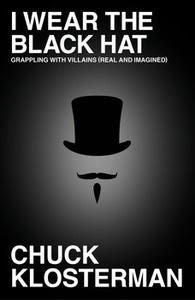Take a photo of a barcode or cover
funny
informative
reflective
slow-paced
Moderate: Bullying, Death, Genocide
Minor: Antisemitism, Murder, War
Algunas ideas muy interesantes sobre la 'maldad'... El problema es que, en varias secciones, requiere un conocimiento previo de algunos personajes más o menos célebres de la cultura popular contemporánea en EE.UU. (deportistas, periodistas...). En general, ameno e ilustrativo.
My initial review for this book was going to be: "Merely clever." But then as I got further I started to think it wasn't even very clever; and it isn't funny. It's too bad, because I enjoyed a couple of Klosterman's earlier books.
Here are a couple of quick examples:
"Necessity used to be the mother of invention, but then we ran out of things that were necessary. The postmodern mother of invention is desire; we don't really 'need' anything new, so we only create what we want." If he's trying to be funny with this sort of end-of-history thinking, he isn't succeeding. But I don't think he's trying to be funny here. Do I need to give examples? I'm not going to bother.
Or this sentence: "He refused to pretend that his life didn't feel normal to the person inside it." WHAT?! The book is full of this kind of thing. It would be head-scratching if it was worth scratching one's head about. But it isn't.
Here are a couple of quick examples:
"Necessity used to be the mother of invention, but then we ran out of things that were necessary. The postmodern mother of invention is desire; we don't really 'need' anything new, so we only create what we want." If he's trying to be funny with this sort of end-of-history thinking, he isn't succeeding. But I don't think he's trying to be funny here. Do I need to give examples? I'm not going to bother.
Or this sentence: "He refused to pretend that his life didn't feel normal to the person inside it." WHAT?! The book is full of this kind of thing. It would be head-scratching if it was worth scratching one's head about. But it isn't.
2.5 stars, some parts were 3 star worthy some parts 2 star worthy.
I was really excited about this book when I heard about it, and I soon learned that it's best to go in without expectations. The first few essays were very lackluster and hard to follow. Klosterman seemed like he was trying really hard to sound smart, or to make this book seem like there was actually a lot of research done. Later essays made up for it - I was especially a fan of his OJ Simpson analysis - but overall, it wasn't what I expected. It might take a few readings for this one to be enjoyable.
"In any situation, the villain is the person who knows the most but cares the least."
This is the general thesis of the book and while it holds up for most subjects, he also makes a point to talk about when it doesn't. I always like reading Chuck Klosterman because he makes me laugh and I also usually learn a few new things. (In this case, I learned about D.B. Cooper and Kim Dotcom.) Worth a read if you enjoy pop culture but I'd recommend any of Klosterman's nonfiction in the same way. This didn't particularly stand out, in comparison to his other books. I'd give it a 3.5, if Goodreads let me do so but instead he'll get the rounded up 4.
Some of my favorite quotes:
"Let's pretend Batman is real. [I'm aware that this opening is enough to stop a certain kind of person from reading any further. It could be the opening line from an episode of Community that references a previous episode of Community. But that's life. That's how it goes.]"
"The future makes the rules, so there's no point in being mad when the future wins."
"There's a person literally named 'Kim Dotcom'? And this person is a 350-pound, egocentric German multimillionaire who never went to college? And he got famous for being a computer hacker who refers to himself as Dr. Evil? And he lives in a mansion in New Zealand? And he participates in European road races and is the world's best Modern Warfare 3 player? And he has a beautiful wife of unknown racial origin? And his twenty-four-acre, $30 million estate is populated with life-size statues of giraffes? And he likes to be photographed in his bathtub?"
"In two hundred years, I suspect historians will use [Sarah] Palin as an example of how insane America became in the decade following the destruction of the World Trade Center, and her origin story will seem as extraterrestrial and eccentric as Abe Lincoln jumping out of a window to undermine a voting quorum in 1840."
"Hitler remains the best argument against charisma."
This is the general thesis of the book and while it holds up for most subjects, he also makes a point to talk about when it doesn't. I always like reading Chuck Klosterman because he makes me laugh and I also usually learn a few new things. (In this case, I learned about D.B. Cooper and Kim Dotcom.) Worth a read if you enjoy pop culture but I'd recommend any of Klosterman's nonfiction in the same way. This didn't particularly stand out, in comparison to his other books. I'd give it a 3.5, if Goodreads let me do so but instead he'll get the rounded up 4.
Some of my favorite quotes:
"Let's pretend Batman is real. [I'm aware that this opening is enough to stop a certain kind of person from reading any further. It could be the opening line from an episode of Community that references a previous episode of Community. But that's life. That's how it goes.]"
"The future makes the rules, so there's no point in being mad when the future wins."
"There's a person literally named 'Kim Dotcom'? And this person is a 350-pound, egocentric German multimillionaire who never went to college? And he got famous for being a computer hacker who refers to himself as Dr. Evil? And he lives in a mansion in New Zealand? And he participates in European road races and is the world's best Modern Warfare 3 player? And he has a beautiful wife of unknown racial origin? And his twenty-four-acre, $30 million estate is populated with life-size statues of giraffes? And he likes to be photographed in his bathtub?"
"In two hundred years, I suspect historians will use [Sarah] Palin as an example of how insane America became in the decade following the destruction of the World Trade Center, and her origin story will seem as extraterrestrial and eccentric as Abe Lincoln jumping out of a window to undermine a voting quorum in 1840."
"Hitler remains the best argument against charisma."
What's with the second chapter? I'm not sure if it had any meaning whatsoever within the overall premise of the book...
Some interesting ideas and personal musings, but nothing in depth. Enjoyable but fairly fast read.
I am an absolute fan of Klosterman's books. I particularly enjoyed this book because of the subject manner. Right and wrong, good and bad is not so black and white. As always Klosterman challenges his readers to reassess their own ideas of morality. You can read more about my thoughts on this book on my blog for book reviews, the link is below!
https://tatteredturtlestittertattle.wordpress.com/
https://tatteredturtlestittertattle.wordpress.com/
Klosterman tends to wander a bit, but there are some interesting essays here.



